Written for South Front by Daniel Edgar
Unlike the stagnant political quagmires and latter-day Goebbels & Co. media complexes that maintain tight control over the State, the economy, international relations, and all public discussion and debate over these topics in most of Europe, North America and other NATO bastions of the ‘free world’, there is never a dull moment in Latin American politics where there is a long tradition of military coups (usually in close collaboration with the traditional political and economic elites and the United States), along with animated public debate, mass social mobilization, rebellions and revolutions by ‘the people’ in most countries. In Peru, after a pause during the Christmas – New Year period, the mass social protests resumed on the 4th of January, with more social sectors and political factions and groups adding their voices to the opponents of the coup d’etat. The situation also remains tense and volatile in Brazil, where pro-Bolsonaro/ military groups continue trying to destablilize and overthrow the government of Lula da Silva.
Ongoing mass protests and social mobilization in Peru
In Peru, the post-coup regime nominally headed by Dina Boluarte – but largely based on and controlled by the remnants and successors of the political factions that ruled Peru with an iron fist during the Fujimori dictatorship, buttressed and enforced by the military and police – is still refusing to budge and appears determined to cling to power at any cost, trying to smash the protests by brute force whilst claiming to be a democratic expression and legitimate representative of the same people it is wantonly massacring. This uncompromising attitude has been encouraged and supported by the United States.
Although there are major discrepancies between official accounts and those of independent observors and civil society organizations, it is estimated that around 55-60 protestors have been killed during the protests and blockades of key transport routes and infrastructure (most of the victims unarmed protestors who died from bullet wounds fired by the ‘security forces’) with many hundreds of others seriously injured, and hundreds of protestors have been arrested.
The military and police forces that have been deployed to contain, disperse and if possible quash the protests and all political opponents (at the same time protecting the vast properties and privileges of the oligarchs, landlords, and foreign investors that they serve – the latter particularly active in the lucrative mining sector, which operates with little or no regard for social and environmental standards) are particlarly vicious and deadly when groups of protestors try to occupy or surround airports, presumably because the airports enable the privileged sectors of society to continue with their luxurious jet-setting lifestyles largely uninterrupted and undisturbed by the misery, suffering and turmoil afflicting the rest of the country (apart from their strategic importance to the military and police forces to deliver weapons and equipment and redeploy their forces rapidly to crush and disperse the protestors at key social mobilization points).
Over the last week the protests and mass social mobilization have become a massive nationwide avalanche that may yet sweep away the coup regime and its collaborators through sheer force of numbers, with most of the country’s major trade unions, student and professional associatons and rural and Indigenous organizations and social movements joining the protests, with the latter organizing caravans in regional areas headed for Lima vowing to ‘occupy the capital’ until Boluarte resigns.
While the strategy of ruthless oppression and attrition being waged by the coup regime could achieve the intended result of crushing and exhausting the mobilized sectors as the physical, emotional and economic costs of the protests and social mobilization become increasingly unbearable, it is possible that if the coup regime refuses to give ground and agree to dialogue and negotiations over a transitional power-sharing arrangement, it might simply harden the resolve and determination of the protestors, and could even trigger the onset of another catastrophic civil war in the country.
The country suffered from a devastating civil war that peaked from 1980-2000 with the rise of two armed insurgent movements, the Shining Path (Sendero Luminoso) and Tupac Amaru Revolutionary Movement (Movimiento Revolucionario Tupac Amaru). In 2003 a Truth and Reconciliation Commission established to investigate the killings, massacres, and other war crimes and human rights violations that occurred between 1980 and 2000 reported that the total number of people killed during the height of the civil war, whether by the insurgent groups or the armed forces, was approximately 70,000.
Alberto Fujimori was president from 1990 to 2000. Although he was elected to an unprecedented third term, he subsequently fled to Japan when the director of the secret police and one of his closest advisors, Vladimir Montesinos, was jailed for bribing a member of Congress and it seemed that his arrest would soon follow. He returned to neighbouring Chile in 2005 where he was later detained pursuant to outstanding warrants for a long list of corruption, war crimes and human rights abuses committed during his presidency and subsequently extradited to Peru.
After a protracted series of legal proceedings, challenges and appeals he was sentenced to more than 35 years’ imprisonment. In March 2022 the Constitutional Court (whose members are appointed by the Congress) ruled by 4:3 to grant Fujimori a medical pardon; Pedro Castillo later appealed against the decision, lodging a complaint with the Inter-American Court of Human Rights. Alberto’s daughter Keiko Fujimori is a veteran politician and is the leader of the political party Fuerza Popular; she was Pedro Castillo’s opponent in the 2021 presidential campaign, losing by a narrow margin.
Presumably, during his detention Alberto Fujimori’s prison cell resembled the facilities that Pablo Escobar built for his incarceration following his agreement to surrender to the authorities in Colombia, or the luxury resort enclave encconced with the notorious La Picota Prison complex in Bogota housing the politicians arrested in the aftermath of the parapolitics scandal for their links to the death squads that have killed many thousands of people in Colombia as part of the counter-insurgency campaign, also terrorizing and forcibly displacing hundreds of communities to make way for sprawling cattle ranches, sugar and African palm plantations or resource development projects. Also with the full support and backing of the US.
The key demands of the opponents of the coup d’etat have not chamged – the immediate resignation of Dina Boluarte and the dissolution of the Congress followed by elections as soon as possible, and the immediate release from prison of ousted president Pedro Castillo – though other demands have been added, namely that those responsible for the deaths of the protestors be duly investigated and prosecuted and the convocation of a constituent assembly to draft a new Constitution (the current constitution was adopted in 1993 during the Alberto Fujimori dictatorship).
Although it remains too early to know what the final result will be, the strategy of embarking on a ferocious crackdown to disperse the protests by brute force appears to have backfired as it has persuaded many other political factions, social sectors and provincial regions who initially remained aloof or undecided to join the protestors. As a consequence, pressure is rapidly building on the members of the coup regime and the National Congress to resign – or, perhaps, to seek a negotiated compromise solution to the political crisis – as the protests have spread to other regions (initially protests and transport blockades were limited to only a few regions and social sectors, mainly in the impoverished and rebellious south of the country, where the inhabitants have a long list of grievances against the traditional ruling elites who have directed the plunder and devastation of their region from their mansions and estates in or around Lima).
After the ouster and arrest of President Pedro Castillo the newly installed coup regime immediately ordered a crackdown against opposition political groups and restive social movements including the Campesino Confederation, the Peruvian Socialist Party and Nuevo Perú, with allegations that police planted weapons and other incriminating materials during raids of the organizations’ premises and then arrested key members for terrorism. Police forced entry into the National University of San Marcos in Lima last week and arrested around 200 students and Indigenous people participating in the protests who were accommodated there, further infuriating protestors.
Originally limited to the southern regions of Puno, Cusco, Arequipa, Apurimac and Ucayali and parts of Lima, the State of Emergency decreed by the coup regime has since been extended to ten regions (there are 25 regions in Peru), nullifying civil rights in the affected areas while at the same time expanding the powers of the military and police. Numerous provincial governors have denounced the coup regime that has usurped all State power and functions at the national level, and the nominal leader of the coup regime (Dina Boluarte) has already had to contend with two rounds of ministerial resignations as some of her accomplices have become increased unsettled and concerned about the nature and objectives of the brutal crackdown and the rising death toll among unarmed protestors. LINK
Most recently, the National Assembly of Regional Governments (Asamblea Nacional de Gobiernos Regionales, ANGR) called for elections to be held for both the Presidency and the Congress as soon as possible. The president of the ANGR, Rohel Sánchez, noted among other observations during an interview on Sunday 22 January that it didn’t make sense for the Congress to select a replacement for Dina Boluarte given that it has a disapproval rating of 88% among Peruvians (as of 2019 almost half of the sitting members of Congress were being investigated for corruption and money laundering, including Keiko Fujimori who spent over a year in prison before securing an early release). LINK1, LINK2
The coup regime has also taken a range of other controversial and provocative steps: among these, the Congress is considering a bill that would expand its powers to authorize mining and energy exploration and development projects in Indigenous territories, and Boluarte has reinstated to key positions some of the war criminals from the Alberto Fujimori dictatorship that terrorised and plundered Peru during the 1990s (the regime was strongly supported by the US), the most controversial of which is the appointment of Juan Carlos Liendo O’Connor (who served in the National Intelligence Ssrvice in the 1990s) as director of the National Directorate of Intelligence. LINK
To top it all off, Dina Boluarte recently presented a proposed law to the Congress to explicity authorize the deployment of armed foreign military personnel in the country, an ominous development suggesting that the coup regime will try to stay in power no matter how many Peruvians it has to kill to do so. And that it has the full suppoer and backing of the US in this endeavour. LINK
Unless a compromise power-sharing agreement can be reached for some type of transitional arangement enabling a return to constitutional rule, the conduct of rank-and-file members of the armed forces will be crucial to the course of future developments: while there have been some isolated instances of refusal to obey orders directing them to violently confront, disperse and in some cases shoot down unarmed protestors (notwithstanding some sporadic and not well organized reprisal attacks that have taken the lives of a couple of members of the ‘security forces’, and an increasing number of acts of destruction and vandalism of public property – including over the last week several reprisal attacks against police stations in some regional areas), the vast majority of the military and police seem content to prop up the coup regime, or at least are not sufficiently disturbed as to risk their relatively privileged position – having a steady job (the economy is a shambles and unemployment is very high), access to health care (the public health system has been beyond breaking point for a while, with Peru being the most affected country by the pandemic on a per capita basis), and having decent accomodation and living standards. Shooting at people, instead of being shot at…
It appears that something happened the night before the coup to stampede a furious or panicked Castillo into making the hasty and ill-considered move to dissolve the National Congress and convene elections. According to two of his ministers, they had spent the previous day preparing his statement in response to the pending no-confidence motion in the Congress and were confident that they had the numbers by a comfortable margin. However, the ministers received a text message the following morning cancelling their scheduled meeting and were subsequently informed of Castillo’s decision to dissolve the Congress by way of the televised public announcement. Ultimately the vote against him was overwhelming and very few of his former political allies and colleagues supported him; only the people mobilized to denounce his ouster and take counter-measures to oppose the coup.
Investigative journalist Ben Norton was, if not the first, among the first to pick up on the fact that the current US ambassador to Peru previously served for a substantial period at the Pentagon before holding a very senior position in the CIA, and that she met with Peru’s Minister of Defence the day before Castillo was ousted and has maintained close contact with the nominal head of the coup regime (Dina Boluarte) ever since.
This suggests that the country is a very high priority for those that control the government in the United States. While there may be other factors involved in the strategic importance of Peru to the US Establishment/ Deep State, the country is in a strategic position to monitor and influence developments throughout much of South America, and also has vast and strategically important mineral reserves (particularly copper, as well as substantial reserves of gold, zinc, lead, silver, iron and gas).
Apart from her regular contact with Boluarte, the US ‘ambassador’ also recently met with the coup regime’s mining and energy ‘ministers’, and it is likely that the hoard of mining conglomerates from the US, Canada, the United Kingdom, Australia and Switzerland that are active in the accelerated plunder of the country’s strategic mineral resources will be among the main beneficiaries of the coup. LINK
China also has a substantial stake in mining projects in Peru. They would do well not to join the business as usual attitude of most foreign investors, extracting the resources as quickly and cheaply as possible by taking advantage of the many corrupt politicians and bureaucrats as well as the lack of State willingness and capacity to closely monitor projects, by voluntarily adopting best practice environmental standards in all their major projects and exercising great care and considertion in their dealings with local communities. If not, while they might maximize their production and profits for a while, their reputation among the people of Latin America will suffer enormously.
It is not unreasonable to suppose that apart from the US ambassador there are many hundreds, more likely thousands, of CIA/ Pentagon agents, informants and collaborators scattered among the security forces and other State institutions as well as the private sector, mass media outlets and social media platforms, civic organizations and society more generally, all of whom are diligently working to influence and manipulate ongoing developments in favour of political factions and other groups and individuals favourable to US interests and objectives. Presumably other foreign intelligence agencies as well as the leadership of the Masonic lodges and their sometimes rivals, sometimes allies of the Opus Dei and other Catholic sects (the former when ‘the people’ constitute a threat to their power and privileges, the latter when the people are safely pacified or subdued), along with other such ‘discrete’ groups, have not been inactive either.
Unlike in Ecuador where the Catholic Church took an active role in the mediation between protestors and the government, eventually leading to an agreement that headed off a prolongation of the conflict and the possibility of a further escalation of the mass protests and ruthless crackdown by the security forces at the behest of President Guillermo Lasso, the Church hierarchy has maintained a low profile during the mass protests and violent clashes taking place in Peru. Perhaps the Church leadership, while not wanting to risk a falling out with the temporal authorites in the country, also does not want to jeopardize its already declining authority and influence among ‘the masses’ by voicing support for the authorites, or attempting to justify or excuse their brutal assault on the people of Peru.
US military interests and assets in Peru
In terms of its military significance, the US has free access to numerous military bases in Peru, some of which serve as logistical hubs for the warships of the Sixth Fleet in the region – in the port cities of Callao, Salaverry, Paita, and Chimbote e Ilo. Presumably, amidst the crushing poverty, unemployment and destitution of the overwhelming majority of the Peruvian people, the brothel business in surrounding zones is doing a roaring trade…
The ports also serve as the main shipment points for the export of petroleum, gas and minerals, almost all of which is controlled by foreign companies. When former US National Security advisor John Bolton toured the country several years ago, he visited several of the port zones, as well as other strategic regions throughout the country including the Amazon basin and areas that have been heavily affected by social protest and armed conflict (in particular Valle del Río Apurímacy Ene, known as VRAEM, which served as a stronghold of the Shining Path armed insurgent group for many years).
According to data compiled by School of the Americas Watch in 2019, over 12,000 US military personnel were deployed to Peru during 2004, and over 5,000 in 2007 and 2008 respectively, while between 2003 and 2010 over 87,000 US military peronnel took part in a diverse range of activities in the country including military exercises, reconaissance and intelligence-gathering missions, training and joint operations with Peruvian military and police including anti-subversive activities, or rest and recreation while their ships loaded supplies. The report also notes the presence of at least two laboratory and biological research complexes since 1983 referred to as NAMRU-6, with installations located in Lima and Iquitos, both of which are operated by the US Marines, apparently for the investigation of tropical infectious diseases.
While I have not been able to find the specific agreements and accords pertaining to US military and intelligence activities in the country, all US military personnel and contractors deployed in Latin America and elsewhere typically enjoy all ‘diplomatic immunities and privileges’ and cannot be detained by local officials; moreover, all military shipments are generally exempt from inspection, so in effect the Peruvian government, armed forces and people probably have no idea of what weapons and related equipment and capacities the US military has deployed throughout the country. LINK1, LINK2
Invasion by invitation
The US is the undisputed master of ‘invasion by invitation’, securing free access to and strategic control over the most important military installations and territories in almost every region in the world. The most extraordinary examples in this respect must be Japan and Germany, where the people have been indoctrinated and conditioned so effectively that most of them now believe that the massive US military occupation of their countries since World War II is for the defence and security of the Japanese and German people rather than to advance US strategic interests, assert full spectrum dominance over the country, and guard lucrative corporate assets.
Other relevant case studies include Australia, where the only Prime Minster since World War II who actively sought to reassert Australian sovereignty and independence (Gough Whitlam) was ousted by a coup d’etat jointly carried out with the United Kingdom in 1975. The coup was ultimately triggered, after a long period of destabilization and preparation, on the same day that Whitlam was going to ask questions in the Parliament concerning the activities and objectives of the US military at the ‘Joint’ Military Facility at Pine Gap (I think they employ some Australian citizens as cooks and toilet cleaners…), particularly regarding the role of the CIA in the facility’s management. John Pilger has summarized key elements of the ‘Anglo-American’ coup that ousted Whitlam in two articles, The CIA coup against ”The Most Loyal Ally and The British-American coup that ended Australia’s Independence. LINK, LINK
Pilger comments of the ouster of Australia’s first and only independent Prime Minister, who put the security and welfare of the Australian people above the neo-imperial interests and demands of the UK and the US:
On November 11, 1975, Kerr infamously sacked the reformist government of prime minister Gough Whitlam, and delivered Australia into the hands of the United States. Today, Australia is a vassal state bar none: its politics, intelligence agencies, military and much of its media are integrated into Washington’s “sphere of dominance” and war plans. In Donald Trump’s current (as of 2020) provocations of China, the US bases in Australia are described as the “tip of the spear”.
There is an historical amnesia among Australia’s polite society about the catastrophic events of 1975. An Anglo-American coup overthrew a democratically elected ally in a demeaning scandal in which sections of the Australian elite colluded. This is largely unmentionable…
During the Whitlam years, 1972-75, Australia briefly achieved independence and became intolerably progressive… The last Australian troops were ordered home from their mercenary service to the American assault on Vietnam. Whitlam’s ministers publicly condemned US barbarities as “mass murder” and the crimes of “maniacs”. The Nixon administration was corrupt, said the Deputy Prime Minister, Jim Cairns, and called for a boycott of American trade. In response, Australian dockers refused to unload American ships.
Whitlam moved Australia towards the Non-Aligned Movement and called for a Zone of Peace in the Indian ocean, which the US and Britain opposed. He demanded France cease its nuclear testing in the Pacific. In the UN, Australia spoke up for the Palestinians… Although not regarded as on the left of the Labor Party, Gough Whitlam was a maverick social democrat of principle, pride and propriety. He believed that a foreign power should not control his country’s resources and dictate its economic and foreign policies…
Another case in point is Ukraine, where the United States provided vast quantities of resources, logistical support as well as full media and diplomatic cover to the instigators of the ‘Maidan Revolution’, closely supervised and directed by Victoria ‘Fuck the EU’ Nuland. Among others, Gordon Hahn has demonstrated how the violence that broke out during the protests was carefully planned in advance as part of a plot to oust President Yanukovich and install a US-friendly regime (The Real Ukrainian ‘Snipers’ Massacre). LINK
The post-coup regime that was duly installed and rubber-stamped by the remaining members of the national Parliament (the Rada) subsequently provided free access to Ukraine’s territory, military and biological research facilities for the US military (whose nuclear capable warships and aircraft were soon prowling along Russia’s borders in Ukraine’s airspace and territorial waters), as well as initiating the selling off of vast swathes of productive farmland and other strategic resources and assets to foreign companies at giveaway prices. LINK1, LINK2, LINK3
In another report, by the Modern War Institute (Analyzing the Russian way of war), describing some of the developments preceding the invasion by invitation in Ukraine, the authors – while parroting the line of Western governments and media as to Russian actions and motives throughout the report (as all academic and media publications must if they wish to avoid being blacklisted and ostracized by the Establishment) – include some interesting comments on other factors that according to some other analysts may have contributed to the Russian decision to invade Georgia in 2008:
Instead of attempting to describe Russia’s actions in the context of a new form of warfare, it would be more beneficial to understand its approach as a reaction to what it perceives as US hybrid warfare that has been undermining its own influence in the post-Soviet space. Key to this phenomenon are the color revolutions that occurred in Serbia in 2000, Georgia in 2003, Ukraine in 2004, and Kyrgystan in 2005…
Russia considers these examples of foreign-sponsored regime change to fall short of war; and since Ukraine’s EuroMaiden protests in 2014 … Russia has only hardened its stance on countering the West’s use of color revolutions to subvert Russian influence in its near abroad…
Russia’s argument is indeed based on historical precedent, though it may attribute excessive credit to US machinations at the expense of legitimate indigenous organizations.
The United States supported anti-Soviet subversion and local resistance movements during the Cold War. Following the collapse of the Soviet Union, United States–sponsored institutes (as well as privately financed ones) funded civil-society movements that contributed millions of dollars to the Rose and Orange Revolutions in Georgia (2003) and Ukraine (2004), respectively…
Meanwhile, in Brazil
Following the narrow victory obtained by Luiz Inacio Lula de Silva (‘Lula’) in the presidential election held on Sunday the 30th of October, the country has been wracked by sporadic outbreaks of mass protest, blockades, occupation and destruction of public property and other violence. A diverse grouping of pro-Bolsonaro/ military factions, collaborators and supporters attempted to thwart the transfer of power on several occasions and continue to seek any and every opportunity to destablilize the government and instigate large-scale violence and chaos as a pretext for the military to launch another coup attempt to ‘restore order’ and neutralize the ‘Communists’.
While such allegations concerning a devious Communist plot to subvert State institutions and overthrow the legitimate government of Jair Bolsonaro have been reported in some Western corporate and alternative media outlets as fact, they are in my opinion complete nonsense. LINK1, LINK2 They can basically be categorized as ghost stories, fairy tales and delirious rantings fit for consumption by people who have absolutely no idea of international geopolitics or of political and economic developments in Latin America.
There were coups, and rumours of coups…
Such allegations are routinely made whenever political parties or social movements emerge that demand political, economic and social reforms to reduce the huge inequalities in wealth, living standards and opportunities that exist throughout Latin America, and that question and challenge the extensive privileges and obscene wealth accumulated over the centuries by the ruling elites and ‘foreign investors’. In the rest of Latin America the epithet ‘Castro-Chavista’ is invariably added to ‘Communist’ – for all Brazil’s stature on the international scene, it remains remote and largely unknown and insignificant in the rest of Latin America, due primarily to the language barrier.
The golden thread running through all of these accounts is that there is an international Communist plot to take over the world (definitely not to be confused with the Globalist plot being carried out by the ‘Bilderbergers’, CFR, Trilateral Commission, Freemasons, B’Nai Brith, Pilgrims Society, IMF, World Bank, BlackRock, Vanguard, etc.), that Cuba is the mastermind of the plot to take control of Latin America, and that it is póised to strike the final fatal blow. This same story is rolled out every time the people in any given country rebel against the extreme exploitation, expoliation and subjugation to which they have been condemned.
In reality, most of the Cubans who are currently in Latin America are doctors or nurses providing free health services in the poorest neighbourhoods on the continent. Cuba does not own or otherwise control, directly or indirectly, any of the gargantuan mining, agribusiness or other resource extraction projects that are ravaging the environment on a horrendous scale and forcibly displacing thousands of local communities across the continent. Cuba does not have major military bases scattered all over the place in almost every country in the hemisphere (whether overt or covert, the latter hidden away in large estates, resource development projects, or other non-descript urban, rural or remote installations and properties), from which it could carry out complex operations of full spectrum dominance, infiltration, subversion and other hybrid warfare activities. Nor has Cuba been directly involved or offered significant material support to any of the countless military coups, counter-coups, uprisings, rebellions or revolutions that have occurred accross the continent. Who has? (Hint – It is not the Cubans. With the possible exception of ex-pat Cuban adventure-seekers and desperados, usually based in Miami.)
Recent political/ security provocations and destabilization in Brazil
Returning to the ´topic of recent political developments in Brazil, Bolsonaro went to the United States prior to the formal transfer of power and still refuses to concede defeat and recognise Lula as president, adding to the tension and instability. While his supporters and collaborators suggest that his failure to attend the swearing-in ceremony was due to his opinion that the election result was fraudulent, his recalcitrant silence and other petulant conduct appears to have been a calculated attempt to encourage violent protests against the election results accompanied by calls for a military coup (with associated activities orchestrated in numerous regions throughout the country, while in the capital many of the provocations and attacks appear to have been planned and coordinated by a large encampment of activists sheltered in the grounds of the military command). There have also been suggestions that Bolsonaro absconded to the US because he fears prosecution in Brazil for the many irregularities committed during his presidency.
While the allegations of rampant irregularities, manipulation and corruption in the tallying of the votes may well be valid (electronic voting machines were used, without the additional precautionary measure of generating paper ballots to be able to check results and verify the count afterwards), it is just as likely that such goings on favoured the agregation of votes for Bolsonaro rather than Lula given that most State institutions have been stacked with avid Lula opponents since the ouster of Dilma Roussef in 2015, consolidated by widespread purges and appointments of selected military personnel and other Bolsonaro supporters or collaborators to key posts following his election in 2018.
Atypically, the US has not supported – either explicitly or tacitly according to almost all available clues and indications – the attempts by pro-Bolsonaro factions to carry out a military coup (the US supported the military coup in Brazil in the 1960s, and has actively supported most of the military coups that have taken place in Latin America since World War II). This probably has more to do with calculations related to domestic politics in the US rather than with concern for democractic values, social justice and the rights, interests and welfare of the Brazilian people; specifically, Bolsonaro is often depicted as the ‘Donald Trump’ of Brazil, a factor that probably influenced the decision of the Biden administration whether to support (or at least tacitly favour) one side or the other or remain strictly neutral.
Polarization within Brazilian society
There has also been an abrupt fissure and increasing polarization among families, groupings and factions within the traditional economic and political elites. While in the past the political/ economic elites and military rulers have generally supported relatively cohesive industrial developments policies and projects, since 2015 public assets have been privatized en masse and the country’s industrial, scientific and technological capacity gutted in favour of a rentier, parasitic and predatory form of crony capitalism that has fattened a small group of politically connected groups and foreign companies at the expense of everyone else.
Many of the traditional ruling elites found themselves largely sidelined and disadvantaged by the Bolsonaro/ military regime, in the broader context of a declining economic base. With the imminent threat of a violent attempt to seize power and install a military dictatorship by extremist elements, which could in a worst case (but nonetheless very plausible) scenario hurl the country into a drawn out and destructive civil war. In this context, in is not overly surprising that the repeated – and increasingly desperate – attempts to pull off a fascist military coup have not received much support beyond the core pro-Bolsonaro/ military political factions and social sectors.
Another factor that has been critical to stymying the plots against Lula and the attempts to reinstate a military dictatorship in response to a fabricated outbreak of social chaos, violence and disorder has been the determined efforts by elements within the police forces (some other police units and commanders are very pro-Bolsonaro, particularly among the military police and some regional groupings) who have acted decisively to confront the violent and destructive actions of pro-coup groups (including an attempt to detonate a powerful explosive device at the international airport in Brasilia, as well as the occupation and vandalism of the three core pillars of the government and the State – the Presidential palace, the National Congress and the Supreme Court – on the 8th of January).
These counter-coup operations undertaken by elements within the national police force in particular have been supported by key personnel in the judiciary as well as the office of the Prosecutor-General who have managed to identify and neutralize many of the main sponsors and enablers of the most violent and dangerous protest groups, and have also received crucial support from the belated but increasingly determined and cohesive mobilization of pro-Lula social sectors and movements, spurred into action by the imminent threat of a return to an all-out fascist-military dictatorship.
It appears that the heightened risk of an extremist/ military coup may have passed its peak and abated somewhat following the occupation and rampage carried out in the three core State institutions in Brasilia, as each of the large-scale coup attempts and related operations carried out over the last few months has forced the coup-plotters to reveal more details as to their organizational and operational structures and expose ever-more of their collaborators and assets to discovery, at the same time increasing the determination of everyone else in Brazil to oppose the coup attempts and identify and castigate those responsible.
What might the future hold?
With respect to the composition, policies and prospects of the new government, in his efforts to build a broad coalition Lula has included a substantial number of ministers in the cabinet whose loyalty and reliability are questionable at best. Notwithstanding the political advantages of such a strategy (apart from the need to combine forces with other political parties and social sectors to confront the imminent threat posied by Bolsonaro and the hard-line/ fascist elements within the military and other State institutions, Lula also needs the approval of several opposition political parties to implement many of his policies as his core allies do not have a majority in the National Congress), it also entails significant disadvantages and risks, and he faces an extremely difficult and unenviable task in consolidating the government and re-establishing some semblance of order and efficiency in State institutions, particularly given the numerous hostile and unrepentant commanders in the military and other branches of the ‘public security forces’ who are collaborating extensively with other powerful sectors in Brazilian society to prevent him from consolidating his control over the government and stabilizing economic and political conditions throughout the country.
A major challenge and urgent task will be building the effectiveness, integrity and credibility of all State institutions. It is absolutely vital that all corruption investigations and related activities be non-partisan and accompanied by comprehensive analysis of the entire system of government at all levels – national, provincial and municipal – as well as the financial system, economic sectors and market structures.
One of best informed analysts of Latin American politics and economics among Westerners, James Petras, is one of the staunchest critics of the policy of ‘appeasement’ and broad coalition-building that has been adopted by many of the progressive/ revolutionary/ populist governments in the region. He has written numerous detailed articles and books (see for example Venezuelan elections: A choice and not an echo) describing the political and economic landscape as well as the elaborate overarching financial superstructure geared for anonymous theft and plunder throughout the region, and he has devoted considerable time to outlining the possible pitfalls and limitations that such a policy of appeasement and compromise with the traditional ruling elites entails, specifically during Lula’s first two presidential terms, as well as elsewhere in Latin America
Considered from this perspective, although many of the traditional political and economic elites in Brazil may have agreed to form a tactical alliance with Lula in order to defend their interests against the greater (perceived) threat of another term with Bolsonaro as president, it is likely that at least some of them consider this to be a necessary and temporary measure while they scheme to recapture power for themselves, and it would be unwise to count on their support once Bolsonaro is out of the way and dismiss the possibility of another ‘parliamentary coup’ (such as the one that ousted Dilma Roussef) or a similar type of manoeuvre against the Lula presidency in the future.
To deepen the process of reform or compromise?
In terms of the new government’s prospects and alternative courses of action that could be taken, compromise coalitions can also severely limit the available options with respect to the types of structural reforms and initiatives that are necessary if the profound structural characteristics embedded in the political and economic systems that generate inequality and facilitate corruption and cronyism are to be addressed. As a consequence, rather than investigating and reforming the core structural features that generate and perpetuate the extreme inequalities that are a universal feature of Latin American countries and preserve the privileges and advantages enjoyed by the ruling elites, the new government may be limited to, in effect, little more than a variety of poverty alleviation programs and subsidies that provide some relief against the poverty and misery of the vast sector of impoverished Brazilians without changing the main systemic elements that are responsible for the existing conditions of great inequality and political and economic marginalization.
Some of the key policies and sectors of particular relevance in this sense include the extent to which the government can review and propose reforms related to, for example: Limits on foreign land ownership and control over strategic infrastructure, resources and services; A comprehensive investigation and audit of the foreign debt, as well as in terms of the privatization of State assets, public land and natural resources and the compliance of major resource extraction and agribusiness projects with all relevant fiscal, administrative, social and environmental norms and standards; Actively confronting and challenging the use of tax havens and secrecy jurisdictions, as well as a comprehensive review of corporate and taxation regimes to simplify them and reduce opportunities for tax evasion and fraud.
Some relevant examples from Venezuela
A similar analysis in the Venezuelan context– Revolutionise or compromise – expresses similar critiques and concerns. For example, none of the people and groups involved in the arrempted coup in Venezuela in 2002 were prosecuted, and many of them subsequently continued with their extremely divisive and destructive schemes to obstruct, sabotage and overthrow the Chavez government.
A particularly relevant case in this instance is the Polar corporate empire which controls a huge proportion of the lucrative food and beverage sectors in Venezuela, including beer and maize flour (the company also has a major presence in the maize flour sector in Colombia, raising questions as to whether the company may have actively contributed to the production crisis that has affected many staple goods in Venezuela and profiteered by clandestinely exporting Venezuelan produce to Colombia). LINK
Apart from disrupting and manipulating the supply of maize flour, coffee, cooking oil and other staple products essential to everyday life in Venezuela, the politically and economically powerful conglomerate has been accused of undertaking a range of other activities with the intention of discrediting the government’s economic management and destabilizing the country. It would also be well positioned to contribute to efforts to ‘make the economy scream’ in Colombia if it were inclined to do so. Inflation has indeed shot up in Colombia since the progressive president Gustavo Petro assumed office in August 2022, including in economic sectors that logically should not be significantly affected by the global trend of increased inflation (though much of this is no doubt due to opportunistic price increases at all levels of the economy).
More generally, the investigative reports Cisneros y el libro Narcotráfico S.A.: La nueva eura del opio and El régimen de transición y el capital español en el saqueo de América Latina provide many insights and clues as to the typical characteristics and methods of the oligopoly and oligarchy structures that still prevail in many Latin American countries, as well as the underlying political alliances and State connections that make them so powerful, pervasive and resistant to reform.
Meanwhile, control over many other lucrative and strategic sectors or basic essential goods and services (such as cosmetics, personal care and domestic cleaning products) is exercised by a small number of foreign companies (Unilever, Colgate-Palmolive, Johnson & Johnson). In all these instances, the Venezuelan government could make substantial inroads into capturing a significant market share without resorting to controversial nationalization of the companies’ production facilities by investing in substitute products, raising awareness of the importance of changing consumption habits to support national and local industries and production, and directly supporting regional and local cooperatives and other small and medium enterprises (see for example, Another beer is possible). While significant progress has been made along these lines in some sectors, in many others such projects for the recuperation of national economic sovereignty have not been contemplated, or have been carried out in the past but have languished due to insufficient planning, support and accountability.
Other areas that have been identified by analysts and activists as requiring more determined and effective ‘revolutionary’ investigation, planning and action by the Venezuelan government include: The rural land reform and integrated rural development projects continue to be severely hampered by powerful rural landlords with the collaboration of regional politicians, bureaucrats and authorites; Increased opportunities for worker participation in the management and accountability of State-owned enterprises; The persistent networks and practices of corruption, nepotism and cronyism have not been adequately confronted and still constitute a huge obstacle to the development and implementation of progressive political, economic and social programs and projects.
MORE ON THE TOPIC:



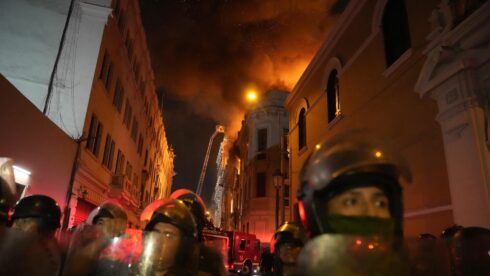
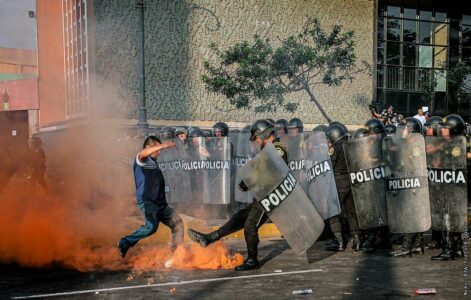
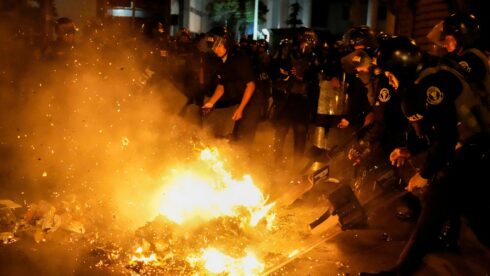
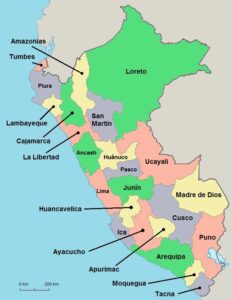
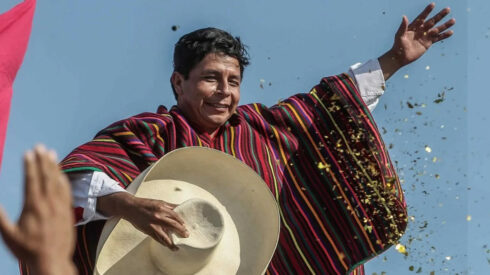
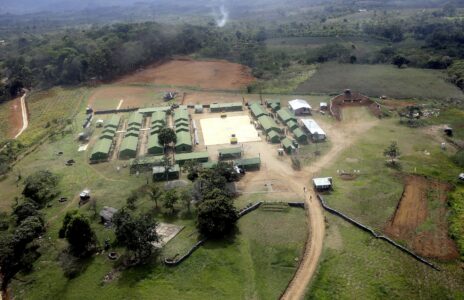
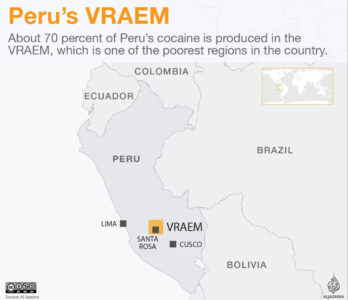
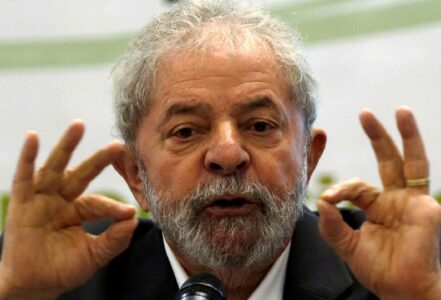





Good article. It might be added, that Brasil’s and Argentina’s presidents seek to introduce a common South American currency, the SUR. That is to strengthen local economy and make them less dependent on “external factors” – a clear hint to the dominant US dollar. The multipolar world is indeed advancing quickly. It is to be hoped that US influence in Latin America is waning.
The called SUR would be more likely a globalist scheme like the Euro than any “multipolar” anything.
Car plates in Brazil are already legal across South America since 2020.
sf are jew sympathizers, and so are destined to die like filthy jews.
Nobody cares about Lula out of the media-made small bubble circles.
It’s the usual fake president elected through shadow elections that can’t walk on streets without extreme security.
The kind of Biden, Macron, Trudeau, etc.
Report:
A lot of people are getting tired of holding up oranges.
My god, I didn’t know it was possible to talk so much shit in a single article.
You “anti-atlanticist” are a disgrace to humanity.
In a moment you criticize the globalist culture but in another you suck the dick of the guy who loves to apply this in a country as long as he signs a letter saying he is a friend of Russia and China.
Talks about Peru’s economy being in shambles, while supporting protests that grind the economy to a halt, by blocking roads! Talks about the ‘lucrative’ mining sector as if it is a golden goose that can just be cut open to get all the golden eggs out of, at once.
It seems to me that in Peru you have a struggle between powerful corporations, mining companies etc, and left wing agitators who have taken over the schools, media, and most of the government. Much like in America. Neither side actually cares for the people of Peru, but at least the corporations don’t PRETEND to, they just say “If you will work for us, we will pay you”, while the leftists say “You do not have to work, you are owed money by the oppressors!”
With the events in Brazil, for me Lula – with his election rigged like Biden’s, he won’t hold up for long. He’s very old, he thinks he has an iron fist, but more than half of Brazil is against him. therefore Lula either dies or falls. Wishes.
The person that wrote this trash of article shilling for the corrupt lula regime is hiding the fact that lula like biden are elected by the Cia and the council of foreign relations. The Brazilian people never voted for lula same as the Americans never voted for biden. Reality is that civil servants in the USA are controlling the elections of south central and North America\ Canada Europe and Australia. The key peoples are in control. Until this persons plus their families are assassinated as a message to the cia, nothing will change
The current demonstrations against any form of government, including the presidential position a woman is abusing and bleeding the minds and souls of the people regardless of any background that if Her positional acts continues to create problems among my people I cannot tolerate, like in other countries including The United States 🇺🇸 and Brasil 🇧🇷, also remembering the momentous event of the Berlin Wall collapse in 1989 (the year I was born), it shall happen again as an important step for history, that if Communism fell by the people, then Capitalism will be the same because it’s not about politics as the problem but the general will of the people uniting for freedom, together can overcome what’s considered the impossible.
Only you can make history happen.
LuLa regime is hiding the fact that lula like Biden are elected by the CiA and the Council of foreign relations. The Brazilian people never voted for LuLa same as the Americans never voted for Biden.
Only a military coup can help Brazil or Brazil will continue as a CiA Project
From the beginning, this retired military officer and member of the Partido Liberal – Liberal Party – let it be known that he admired the 45th president of the United State of America, Mr. Donald Trump. They had similar ways of talking about women, minorities, and disaffected. They even shared similar perspectives when it came to the way they dealt with the 2019 Covid pandemic.
popular Brazilian saying goes: Água mole em pedra dura tanto bate que até fura (soft water on hard stone beats so long that it breaks). And it happened exactly as the popular saying set forth. The Brazilians who listened to the social media calls to storm the Congress, Supreme Court and Planalto Palace, had no proof that the elections were rigged.
https://youtube.com/shorts/-REGWtTWm6g?feature=share In this video, they are celebrating for stealing the Bolsonaro votes.Brazilian election results are fake and should be cancelled.
the US is supporting protests in Mexico and aims to overthrow the government, which is a basis for that country to equip itself against the aggressor and that is an opportunity for Russia. American pansies deserve to be shelled every day and have their next wars waged in their living rooms